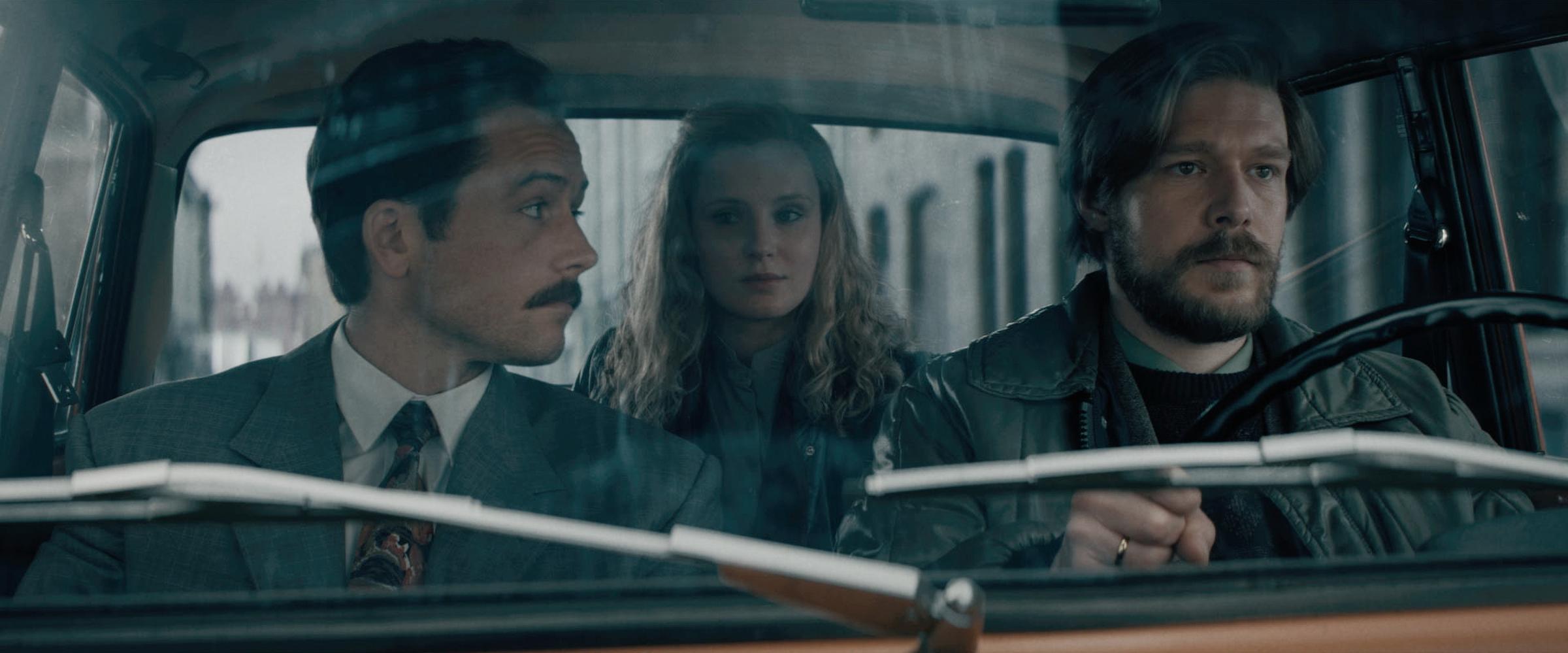In the nearly 40 years since Tetris was invented, it has sold more than 520 million copies worldwide and been downloaded over 615 million times on mobile devices alone. The puzzle game—which requires players to fit together geometric shapes composed of four squares to form horizontal lines—skyrocketed to popularity so quickly that in 1994, writer Jeffrey Goldsmith coined the term the Tetris Effect to explain the psychological phenomenon that occurs when people devote so much time and attention to something that it begins to pattern their thoughts, mental images, and dreams.
Tetris, a new Apple TV+ movie streaming March 31, explores the true story behind the late 1980s legal battle that led to the classic video game becoming an international phenomenon. The Cold War-era thriller, directed by Jon S. Baird and written by Noah Pink, follows Henk Rogers (Taron Egerton), a Dutch game designer who, after learning about Tetris at a 1988 Las Vegas tradeshow, traveled to Moscow to secure the game’s licensing rights from behind the Iron Curtain.
It was in Moscow that Rogers met Alexey Pajitnov (played by Nikita Efremov), a software engineer at the Soviet Academy of Sciences who created the original Tetris on a rudimentary Electronika 60 computer. Despite the challenges associated with obtaining the rights to products developed in Russia from the Soviet Union’s communist government, Rogers and Pajitnov worked together to bring Tetris to the global masses and, along the way, formed a partnership that has stood the test of time.
Read more: Review: Extrapolations Gets So Close to Doing Climate-Change Drama Right
How did Henk Rogers acquire the rights to Tetris?

Like in the movie, after Tetris was ported to the IBM PC in 1985 and began to spread throughout the Soviet Union, Hungarian businessman Robert Stein (played by Toby Jones) made an attempt to secure the computer rights to the game for his company, Andromeda Software. Miscommunication over the Soviet licensing process led Stein to prematurely sell the PC version of Tetris to Spectrum HoloByte, the American arm of British video game publisher Mirrorsoft, and the Tetris computer game was released to instant acclaim despite Stein not having a deal with the Russians.
In the spring of 1988, Stein finally signed an agreement with Elektronorgtechnica (Elorg), the state-owned agency with a monopoly on Russia’s import and export of software, for the computer rights to Tetris (with “computer” interpreted by Stein to mean both PC and home video game-console). However, the contract expressly forbid Stein from licensing the rights to the arcade and handheld versions of the game, as well as any other mediums “which we did not dream about yet.”
Meanwhile, Rogers was busy obtaining distribution rights from Spectrum Holobyte for Tetris computer and console games in Japan. Rogers went on to land a deal with Nintendo via his company Bullet-Proof Software, and Tetris for the Nintendo Famicon console was released in late 1988. With Nintendo’s groundbreaking Game Boy in the works, Rogers then set out for Moscow in hopes of acquiring the handheld rights for Tetris.
Rogers traveled to the Soviet Union on a tourist visa rather than a business visa, a decision that complicated his efforts to meet with anyone involved with Tetris in an official capacity. “I am about to walk in the door and my interpreter says, ‘You can’t go in there,'” Rogers told KCRW. “And I said, ‘What do you mean, I can’t go in there?’ ‘You’re on a tourist visa. You can’t go in. You’re not allowed to speak to anyone.’ And I said, ‘Well, I didn’t come all this way to stand in front of the door and go back to Tokyo to get a visa. I’m going in.'”
Rogers’ arrival in Moscow with the Nintendo Famicon version of Tetris led to the revelation that Stein had been trading rights he did not own. A tense three-way battle over the rights to the game ensued between Rogers, Stein, and Mirrorsoft owner Robert Maxwell (played by Richard Allam) and his son Kevin Maxwell (Anthony Boyle). After a series of complicated negotiations made all the more fraught by Soviet-era tensions, Elorg ultimately granted the rights for Tetris console and handheld games to Rogers for distribution by Nintendo.
Rogers also cemented a friendship with Pajitnov during his time in Moscow and eventually helped him to profit from the game he had invented. Following Tetris‘s world premiere at South by Southwest earlier this month, both Rogers and Pajitnov said during a post-screening panel discussion that the movie accurately portrayed their lives during that time period.
“They captured what happened to me over a year-and-a-half in two hours,” Rogers said, with Pajitnov adding, “That was emotionally, intellectually and spiritually a very truthful movie.”
More Must-Reads from TIME
- Donald Trump Is TIME's 2024 Person of the Year
- Why We Chose Trump as Person of the Year
- Is Intermittent Fasting Good or Bad for You?
- The 100 Must-Read Books of 2024
- The 20 Best Christmas TV Episodes
- Column: If Optimism Feels Ridiculous Now, Try Hope
- The Future of Climate Action Is Trade Policy
- Merle Bombardieri Is Helping People Make the Baby Decision
Write to Megan McCluskey at megan.mccluskey@time.com